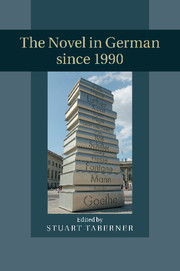Book contents
- Frontmatter
- Contents
- Contributors
- Acknowledgements
- Introduction: The novel in German since 1990
- Chapter 1 Robert Schindel???s Geb??rtig (Born-Where)
- Chapter 2 G??nter Grass???s Ein weites Feld (Too Far Afield)
- Chapter 3 Thomas Brussig???s Helden wie wir (Heroes Like Us)
- Chapter 4 Christa Wolf???s Medea. Stimmen (Medea. A Modern Retelling)
- Chapter 5 Zafer ??enocak???s Gef??hrliche Verwandtschaft (Perilous Kinship)
- Chapter 6 Monika Maron???s Endmor??nen (End Moraines)
- Chapter 7 Martin Walser???s Ein springender Brunnen (A Gushing Fountain)
- Chapter 8 Michael Kleeberg???s Ein Garten im Norden (A Garden in the North)
- Chapter 9 Christian Kracht???s Faserland (Frayed-Land)
- Chapter 10 Elfriede Jelinek???s Gier (Greed)
- Chapter 11 Karen Duve???s Dies ist kein Liebeslied (This Is Not a Love-Song)
- Chapter 12 Herta M??ller???s Herztier (The Land of Green Plums)
- Chapter 13 W. G. Sebald???s Austerlitz
- Chapter 14 Walter Kempowski???s Alles umsonst (All for Nothing)
- Chapter 15 F. C. Delius???s Mein Jahr als M??rder (My Year as a Murderer)
- Chapter 16 Yad?? Kara???s Selam Berlin
- Chapter 17 Daniel Kehlmann???s Die Vermessung der Welt (Measuring the World)
- Chapter 18 G??nter Grass???s Beim H??uten der Zwiebel (Peeling the Onion)
- Select bibliography
- Index
- References
Chapter 6 - Monika Maron???s Endmor??nen (End Moraines)
Published online by Cambridge University Press: 07 September 2011
- Frontmatter
- Contents
- Contributors
- Acknowledgements
- Introduction: The novel in German since 1990
- Chapter 1 Robert Schindel???s Geb??rtig (Born-Where)
- Chapter 2 G??nter Grass???s Ein weites Feld (Too Far Afield)
- Chapter 3 Thomas Brussig???s Helden wie wir (Heroes Like Us)
- Chapter 4 Christa Wolf???s Medea. Stimmen (Medea. A Modern Retelling)
- Chapter 5 Zafer ??enocak???s Gef??hrliche Verwandtschaft (Perilous Kinship)
- Chapter 6 Monika Maron???s Endmor??nen (End Moraines)
- Chapter 7 Martin Walser???s Ein springender Brunnen (A Gushing Fountain)
- Chapter 8 Michael Kleeberg???s Ein Garten im Norden (A Garden in the North)
- Chapter 9 Christian Kracht???s Faserland (Frayed-Land)
- Chapter 10 Elfriede Jelinek???s Gier (Greed)
- Chapter 11 Karen Duve???s Dies ist kein Liebeslied (This Is Not a Love-Song)
- Chapter 12 Herta M??ller???s Herztier (The Land of Green Plums)
- Chapter 13 W. G. Sebald???s Austerlitz
- Chapter 14 Walter Kempowski???s Alles umsonst (All for Nothing)
- Chapter 15 F. C. Delius???s Mein Jahr als M??rder (My Year as a Murderer)
- Chapter 16 Yad?? Kara???s Selam Berlin
- Chapter 17 Daniel Kehlmann???s Die Vermessung der Welt (Measuring the World)
- Chapter 18 G??nter Grass???s Beim H??uten der Zwiebel (Peeling the Onion)
- Select bibliography
- Index
- References
Summary
Published at the beginning of the twenty-first century, Monika Maron’s novel Endmoränen (End Moraines, 2002) is an answer of sorts to the literature of the 1990s, much of which sought to capture the spirit of this decade of rapid change. Many of these works feature young protagonists who live in the present and whose lives evolve in close connection with the developments in uniting Germany, in particular in Berlin. By contrast, Maron’s Endmoränen is told from the perspective of an ageing protagonist who reflects on the end of the German Democratic Republic and its impact on people’s lives more than a decade after unification. In a novel that can be regarded as Maron’s response to the issue of ‘what remains’ of the GDR, recollections of opportunities missed blend with questions about growing older and a narrowing of options in life despite the freedoms brought about by the end of the East German state. Endmoränen, whose title alludes to the debris left behind by the glaciers after the last ice age, suggests that these remnants are plural, their foundation, like that of the moraine, no longer visible yet decisively shaping the layers that have accumulated on top. While the end of the GDR meant a sudden increase in prospects for many, it also forced East Germans to find new ways of telling and interpreting their life stories in the absence of the state oppression that at times served as rationalisation for personal failures and disappointments. This biographical challenge informs Maron’s novel.
Endmoränen, which consists of twenty-one sections of varying length, is the story of Johanna, a woman in her early fifties who makes a living as a biographer and as a writer of epilogues and publicity blurbs on record covers. Johanna spends a summer in her cottage in Basekow, a tiny village in Vorpommern near the Polish border, unsuccessfully trying to write the biography of Wilhelmine Enke (1753–1820), the mistress of the Prussian King Friedrich Wilhelm II (1744–97). The house, which Johanna and her husband Achim, a Kleist scholar, had bought and renovated in the late 1980s, signifies continuity beyond the end of the GDR but, as its inhabitants grow older and the surrounding trees taller, it also marks the passing of time. Johanna’s writer’s block gives her the opportunity to reflect on the function of literature in a market-driven economy and, importantly, to revisit the received notion that the absence of censorship post-unification has thrown former GDR writers into a crisis of legitimacy. Biography, both in its written form and as an everyday narrative, plays a central role in Maron’s novel as a construct that allows the individual to endow his or her life with meaning. As Johanna ponders her own past as a writer in the former GDR whose creative strategies were a response to censorship, she develops an argument for literary biography after 1989 and makes a plea for the nuanced and self-critical evaluation of personal circumstances within the socio-political contexts that shape them.
- Type
- Chapter
- Information
- The Novel in German since 1990 , pp. 94 - 107Publisher: Cambridge University PressPrint publication year: 2011

